by Raad Alkadiri
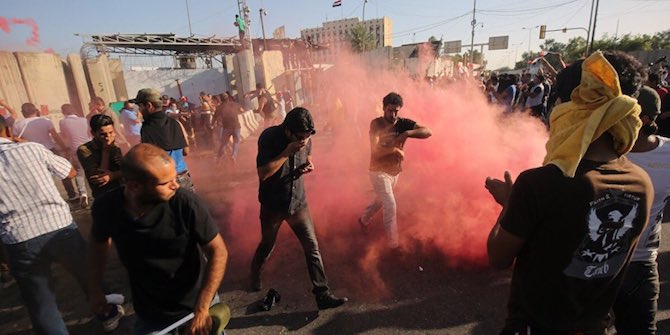
July has always been a politically feverish month in Iraq. Nevertheless, the violent protests that have swept southern Iraq over the past two weeks have been unprecedented both in scale and focus. Ports blocked; airports closed; provincial government offices sieged; and, most telling of all, local headquarters of Islamist Shi’a parties and allied militias attacked. Latest reports put the death toll at eight to ten, with over 100 injured.
Unrest like this, in the heartland of the Islamist Shi’a parties that dominate Iraqi politics, are bound to tempt overly apocalyptic prognostications. Yet the extent of the latest protests and their targets do hint at something more deep-seated than just simple frustration with a lack of services and jobs. Their tone suggests that protestors are angry at the failures of Iraq’s post-2003 political system and the country’s lack of competent leadership. If so, then the current crisis represents the most serious existential challenge that Iraq’s political elite has faced since Saddam Hussein’s regime was overthrown.
Signs of popular exasperation with the status quo have been evident for some time. Growing discontent with the poor state of local services and bad governance has led to periodic demonstrations across the country – including the Shi’a heartland of the south – over the past few years. Protests in Basra in 2015 quickly spread to other southern provinces and culminated in massive demonstrations in Baghdad, where Muqtada al-Sadr and his supporters stormed the Green Zone. There have been smaller-scale demonstrations in the south since then, which have grown in number over the past few months. A further sign of the depth of Iraqi disillusionment with the political system was the low turnout in the 12 May elections: officially, over 55 percent of the electorate boycotted the poll, and the real figure may have been significantly higher as Iraqis who have grown cynical with the country’s politics voted with their feet.
The sources of popular alienation from politics are easy enough to see. Years of maladministration, corruption, poor of services, declining rule of law and a gross lack of accountability have undermined the population’s faith in the sincerity of the political elite and in their ability to fix the country’s problems. Successive governments since 2004 have been ‘big tent’ affairs, based on inclusiveness, ethno-sectarian quotas and – to a certain extent – consensus. But in practical terms, ‘government of all’ has come to mean ‘government for the few’, led by a Green Zone elite that is effectively unaccountable to the public.
The democratic process continues through elections, but these polls are not a vehicle for change. Time and again the outcome is a national coalition government composed of the same factions (albeit in different proportions to one another based on parliamentary strength) that jealously guard their access to privilege and patronage, and resist meaningful reform. In the absence of opposition politics, the Council of Representatives lacks any incentive to provide oversight and the population lacks alternatives. Meanwhile, politicisation of the judiciary has neutered the effectiveness of the institution as a bulwark against political abuse.
Generational change is also contributing to the schism between ruler and ruled. For the most part, Iraq’s leaders were shaped by the vicious fight against Saddam Hussein’s regime and the ethno-sectarian politics that it spawned. Their mindset remains mired in that tragic past, shackled by an overwhelming focus on the identity of Iraq’s rulers rather than on good governance. But for Iraq’s increasingly young population, almost 75 percent of whom are under 35 years old, memories of the Saddam era and its repression are dim. Their political awareness evolved after 2003, and they judge their rulers on the performance of government since then. As Shi’a political Islam has lost its resonance, issues, not identity, have become paramount for this electorate.
Treading water but no real change
The Abadi government’s immediate response to the crisis has been a combination of spending and jobs promises together with military deployments designed to assuage anger and quell the worst of the violence. But even if these measures restore a modicum of calm, the big questions now are whether Iraq’s leaders can and will absorb the underlying message of the protests, and whether they have the wherewithal to introduce the types of reform needed to redress popular alienation?
Doing so will be a monumental task for Iraq’s political elite. The flaws of the post-2003 system have been allowed to fester and grow for so long that they have become overwhelming; fixing them is a generation-long project, beyond the capacity of any one leader or government. What is needed is root-and-branch reform of Iraq’s institutions, its judiciary and its economy, as well as amending the constitution in order to establish a new political compact that addresses lingering communal grievances and promotes governance. Furthermore, a competent technocracy needs to be developed and empowered, and broad anti-corruption measures need to be introduced. In short, the state needs to be re-built gradually from the ground up.
But if the evidence since the 12 May elections is anything to go by, Iraq’s leaders are intent on doing everything they can to eschew meaningful change. They have wilfully ignored the message of the polls so far, pouring their energy instead into creating another version of big-tent government that will preserve their collective access to power. In doing so, they have sought to marginalise the main proponents of reform, namely Sadr’s Sairoun list that won a slight plurality of seats in the new parliament. Government formation has not been completed yet and there could still be surprises. However, the only real impact of the protests may be to speed up the process (in order to protect prerogatives) rather than alter the nature of government in any productive fashion.
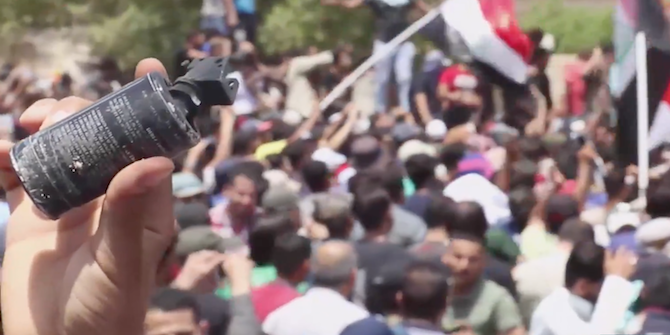
Third-world redux
None of this means that Iraq is faced with imminent implosion. The balance of power between the political elite and population remains heavily in favour of the former, and, with oil prices higher, the government has more funds at its disposal to buy off protestors in the short term. At the same time, the demonstrators themselves lack a collective platform or vehicle for coordinated mobilisation. Beyond Sadr, none of Iraq’s former reformists have stepped up to provide the protest movement with leadership, and no Iraqi politician has offered a detailed reform programme that could be a blueprint for change. Meanwhile, the Shi’a clerical elite (the one body with the moral authority and the organisation to play an active role in supporting the opposition if it wanted to, especially in the south) is in the process of retreating from politics.
Under these circumstances, Iraq’s current leaders may feel that they can ride out protests, albeit at the cost of estranging themselves from growing segments of the Iraqi population. Their model may be the Kurdistan region, where the duopoly of ruling parties has contained a rising tide popular discontent through a combination of repression, corruption, nepotism and rigged elections. In so doing, Iraq may simply become yet another dysfunctional third-world petro-state, with an elite powerful enough to preserve their interests but unable and unwilling to introduce the kind of reforms that would significantly improve its long-term security and economic prospects. Hardly what was intended in 2003, but given Iraq’s history since, perhaps inevitable.



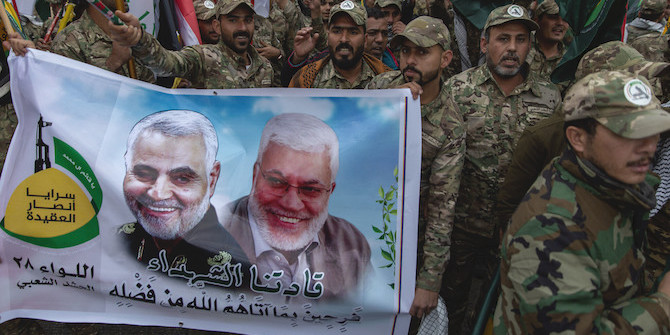

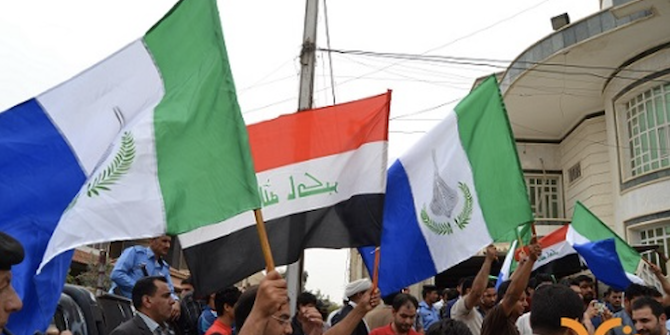
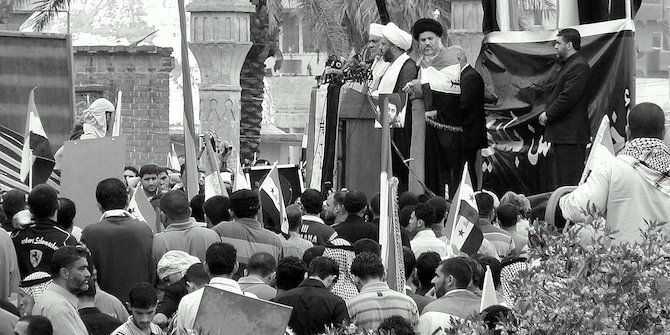
3 Comments